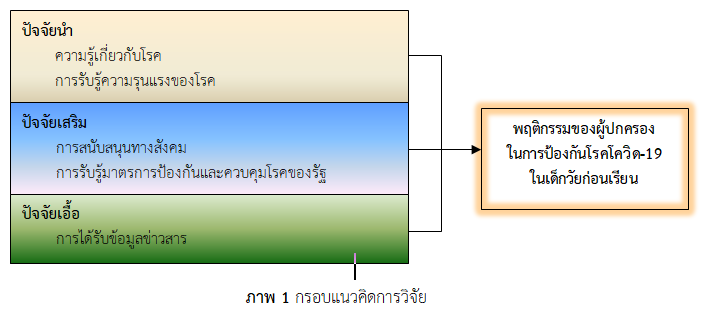ปัจจัยที่มีอิทธิพลต่อพฤติกรรมของผู้ปกครองในการป้องกันโรคโควิด-19 ในเด็กวัยก่อนเรียน
คำสำคัญ:
โรคโควิด-19, เด็กวัยก่อนเรียน, พฤติกรรมของผู้ปกครองบทคัดย่อ
การวิจัยแบบหาความสัมพันธ์เชิงทำนายนี้ มีวัตถุประสงค์เพื่อศึกษาปัจจัยที่มีอิทธิพลต่อพฤติกรรมของผู้ปกครองในการป้องกันโรคโควิด-19 ในเด็กวัยก่อนเรียน ที่เข้ารับบริการในศูนย์พัฒนาเด็กเล็กสังกัดเทศบาลในเขตอำเภอเมือง จังหวัดอุบลราชธานี กลุ่มตัวอย่างเป็นผู้ปกครองของเด็กวัยก่อนเรียนอายุระหว่าง 3 - 5 ปี จำนวน 108 ราย คัดเลือกโดยการสุ่มอย่างง่ายแบบไม่ใส่คืน เครื่องมือที่ใช้ในการเก็บรวบรวมข้อมูล ประกอบด้วย แบบสอบถามข้อมูลทั่วไป แบบสอบถามการรับรู้ความรุนแรงของโรคโควิด-19 แบบสอบถามการสนับสนุนทางสังคม แบบสอบถามการรับรู้มาตรการป้องกันและควบคุมโรคโควิด-19 ของรัฐแบบสอบถามการได้รับข้อมูลข่าวสาร และแบบสอบถามพฤติกรรมของผู้ปกครองในการป้องกันโควิด-19 ซึ่งมีค่าสัมประสิทธิ์แอลฟ่าครอนบาค 0.80, 0.93, 0.87, 0.84 และ 0.85 ตามลำดับ และแบบสอบถามความรู้โรคโควิด-19
มีค่า KR-20 เท่ากับ 0.86 วิเคราะห์ข้อมูลโดยใช้สถิติพรรณนา ค่าสัมประสิทธิ์สหสัมพันธ์ของเพียร์สันและสถิติถดถอยพหุคูณแบบขั้นตอน
ผลการวิจัย พบว่า การสนับสนุนทางสังคม เป็นปัจจัยที่สามารถทำนายพฤติกรรมของผู้ปกครองในการป้องกันโรคโควิด-19 ในเด็กวัยก่อนเรียนได้ดีที่สุด โดยสามารถทำนายได้ร้อยละ 45.3 ปัจจัยที่สามารถทำนายได้ดีเป็นลำดับที่ 2 คือ การรับรู้ความรุนแรงของโรค สามารถทำนายได้เพิ่มขึ้นร้อยละ 16.1 รองลงมา คือ ความรู้เกี่ยวกับโรค สามารถได้เพิ่มขึ้นร้อยละ 3.8 และการได้รับข้อมูลข่าวสาร สามารถได้เพิ่มขึ้นร้อยละ 2 ซึ่งทั้ง 4 ตัวแปร สามารถร่วมกันทำนายพฤติกรรมของผู้ปกครองในการป้องกันโรคโควิด-19 ในเด็กวัยก่อนเรียนได้ร้อยละ 67.3 (R2= 0.673, p < 0.05)
ผลการวิจัยแสดงให้เห็นว่า พยาบาลและบุคลากรทีมสุขภาพควรจัดโปรแกรมที่เน้นการเพิ่มการสนับสนุนทางสังคมของครอบครัว การรับรู้ความรุนแรงของโรค ให้ความรู้และข้อมูลข่าวสารเกี่ยวกับโรคโควิด-19 สำหรับผู้ปกครองอย่างเพียงพอ เพื่อให้ผู้ปกครองมีพฤติกรรมการป้องกันโควิด-19 ในเด็กวัยก่อนเรียนที่ดี นำไปสู่การมีสุขภาพดีของเด็กต่อไป
เอกสารอ้างอิง
Alsulaiman, S. A., & Rentner, T. L. (2018). The health belief model and preventive measures: A study of the ministry of health campaign on coronavirus in Saudi Arabia. Journal of International Crisis and Risk Communication Research, 1(1), 27–56.
Amin, U. A. & Parveen, A. P. (2022). Impact of COVID-19 on children. Middle East Current Psychiatry, 29(9). 1-10.
Bureau of Information Office of The Permanent Secretary of Ministry of Public Health. (2022). The ministry of public health announces that "COVID" spreads more among young children. Retrieved August 28, 2023 from https://www.pr.moph.go.th/?url=pr/detail/2/04/ 172727/. (in Thai)
Department of Health. (2022). Institute of child health development suggest ways to take care and prevent early childhood infection with COVID-19. Retrieved August 28, 2023 From https://www.workpointtoday.com/covid19-369/. (in Thai)
Department of medical service. (2023). Clinical practice guidelines for diagnosis, treatment, and prevention of infection in hospitals Case of Coronavirus Disease 2019 (COVID-19). Retrieved April 18, 2023 from https://www.covid19.dms.go.th/backend///Content/ Content FIle/Bandner_(Big)/Attach/25660418150440PM_CPG_COVID- 19_v.27_n_18042023.pdf. (in Thai)
Green, L. W. & Kreuter, M. W. (2005). Health program planning: An educational and ecological Approach. (4th ed.). New York: McGraw-Hill Higher Education.
Jaide, C., Santati, S., & Kongsaktrakul, C. (2013). Factors related to child care workers’ behavior in prevention of acute respiratory infection in child care centers. Ramathibodi Nursing Journal, 18(3), 389–403.
Jirojkul, P. (2013). Concepts, theories, health promotion and their use. Bangkok: Project Welfare, Praboromarajchanok Institute. (in Thai)
Kaewsuk, C., Pongjaturawit, Y., & Chaimongkol, N. (2016). Factors Associated with Maternal Behavior in Prevention of Acute Respiratory Infection in Preschool Children. The Journal of Faculty of Nursing Burapha University, 24( 4), 54-64.
Kaewsuk., Pongjaturawit, Y., & Chaimongkol, N. (2015). Predictors of maternal behavior in prevention of acute respiratory infection in preschool children. Academic conference report and presentation of research results National and International Level 6 National Group science, 1(6), 130-140. (in Thai)
Kanjanapradub, T. (2023). Children infected with COVID must be careful not to have severe symptoms. Retrieved January 11, 2023 from https://www.paolohospital. com/th-TH/chokchai4/Article/Details/Covid infection in children - to be careful not to have severe symptoms. (in Thai)
Kongkun, P., Kaewsuksai, R., Waedueramae, R., Tongkoop, B., & Salaeh, M. (2021). Prevention of Coronavirus Disease (COVID-19) among food vendors in Narathiwat province: Relationships Between Perception, Social Support and “New Normal Behaviors”. The Southern College Network Journal of Nursing and Public Health, 8(3), 133-146.
LaMorte, W., (2022). The health belief model. Retrieved November 3, 2022 form https://www.sphweb.bumc.bu.edu/otlt/mph-modules/sb/behavioralchangetheories/ behavioralchangetheories2.html
Lohmae, U., Yeepaloh, M., & Kajornkittiya, K. (2022). Factors predicting preventive behaviors of COVID–19 among guardians of preschool aged children. Journal of Prachomklao College of Nursing, Phetchaburi Province, 5(1), 12-25.
Maikhaothong, T. (2012). Searching and assessment of health information sources on the web: issues and chapters analysis from research. Journal of Information Science, 23(3), 31-41.
Ministry of Public Health. (2021). Practical manual for early childhood development institutions in preventing the spread of COVID-19. (2nd ed). Bureau of Health Promotion and the National Institute of Child Health Development, Department of Health. (in Thai)
Ounsaneha, W., Laosee, O., Suksaroj, T. T., & Rattanapan, C. (2023). Preventive behaviors and influencing factors among thai residents in endemic areas during the highest epidemic peak of the COVID-19 outbreak. International Journal of Environmental Research and Public Fealth, 20(3). https//www.doi:10.3390/ijerph20032525.
Phansuma, D. & Boonruksa, P. (2021). Knowledge, attitudes, and preventive behaviors of COVID-19 among residents in Pru Yai sub-district, Muang district, Nakhon Ratchasima province. Srinagarind Medical Journal, 36(5). 597-604.
Polit, D. F. & Beck, C. T. (2004). Nursing research: principles and methods. (7thed.). Philadelphia: Lippincott Williams & Wilkins.
Pothisa, T., Ong-Artborirak, P., Seangpraw, K., Tonchoy, P., Kantow, S., Auttama, N., & et al. (2022). Knowledge of COVID-19 and its relationship with preventive behaviors and vaccination among adults in Northern Thailand's community. International Journal of Environmental Research and Public Health, 19(3), 1-14.
Queen Sirikit National Institute of Child Health. (2023). MIS-C (Miss C) and long COVID (Long COVID) conditions in children. Retrieved February 25, 2022 from https://www.children hospital.go.th/15293/our services/press release/state-mis-c-miss-and-long-covid-try- covid-in-children/.
Royal Thai Government. (2023). Announcements and orders. Retrieved August 20, 2022 from https://www.thaigov.go.th/news/contents/details/27963.
Srisuwan, S. (2022). Factors affecting surveillance operations, prevention, and control of COVID-19 at Sai Thong Watthana district. Phichit Public Health Research And Academic Journal, 3(2), 98-107.
Tabachnick, B. G., & Fidell, L. S. (2007). Using multivariate statistics. (5thed.). Boston: Pearson/ Allyn & Bacon.
Ubon Ratchathani Municipality. (2021). Announcement of schools and child development centers under Ubon Ratchathani Municipality. Retrieved July 1, 2022 from https://www.cityub.go.th/New2017/index.php/2017-04-10-03-11-24/25-2017-05- 25-09-29-30/3732-5-9-2564 (in Thai)
Udumrati, V. (2022). Academic papers knowledge development to promote and restore early childhood development after the situation Coronavirus Disease 2019 (COVID-19) pandemic. Retrieved December 30, 2022 from https://www.ecd-covidrecovery.rlgef. com/download/Download Academic Documents/.
Umeta, B., Mulugeta, T., Mamo, G., Alemu, S., Berhanu, N., Milkessa, G., & et.al. (2022). An analysis of COVID-19 information sources. Journal of Pharmaceutical Policy and Practice, 15(1), 49. doi:10.1186/s40545-022-00446-8.
Wongrattana, C. (2010). Writing a Research Outline: Guidelines for Success (2nd ed). Nonthaburi: Thai Niramit Kit Inter Progressive. (in Thai)
World Health Organization. (2023). WHO coronavirus (COVID-19) dashboard. Retrieved August 28, 2023 from https://www.covid19.who.int/.
Witoonsakul, P., Chaisuwan, C., & Rungamornrat, S. (2021). Factors influencing behaviors in preventing COVID-19 of teachers and caregivers in child care centers. Nursing Science Journal of Thailand, 39(4), 41-54.

ดาวน์โหลด
เผยแพร่แล้ว
รูปแบบการอ้างอิง
ฉบับ
ประเภทบทความ
สัญญาอนุญาต
ลิขสิทธิ์ (c) 2023 วิทยาลัยพยาบาลบรมราชชนนี นครศรีธรรมราช

อนุญาตภายใต้เงื่อนไข Creative Commons Attribution-NonCommercial-NoDerivatives 4.0 International License.
บทความที่ได้รับการตีพิมพ์เป็นลิขสิทธิ์ของ วิทยาลัยพยาบาลบรมราชชนนี นครศรีธรรมราช
ข้อความที่ปรากฏในบทความแต่ละเรื่องในวารสารวิชาการเล่มนี้เป็นความคิดเห็นส่วนตัวของผู้เขียนแต่ละท่านไม่เกี่ยวข้องกับวิทยาลัยพยาบาลบรมราชชนนี นครศรีธรรมราช และบุคคลากรท่านอื่น ๆ ในวิทยาลัยฯ แต่อย่างใด ความรับผิดชอบองค์ประกอบทั้งหมดของบทความแต่ละเรื่องเป็นของผู้เขียนแต่ละท่าน หากมีความผิดพลาดใดๆ ผู้เขียนแต่ละท่านจะรับผิดชอบบทความของตนเองแต่ผู้เดียว





